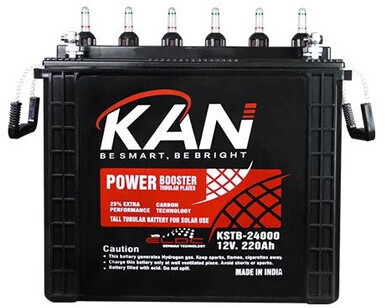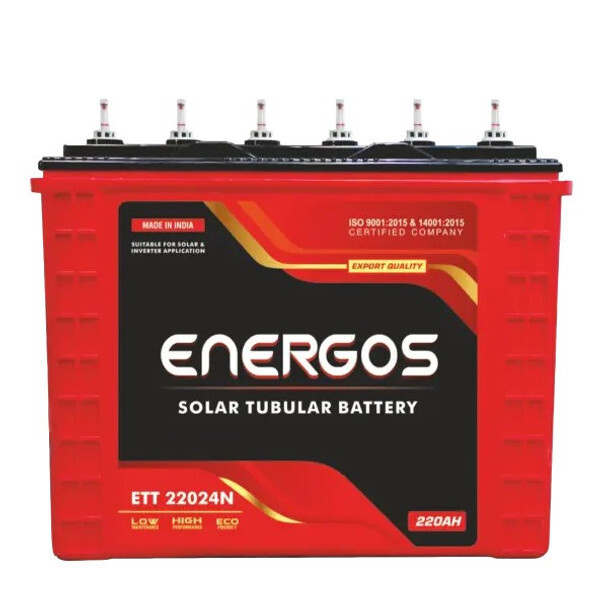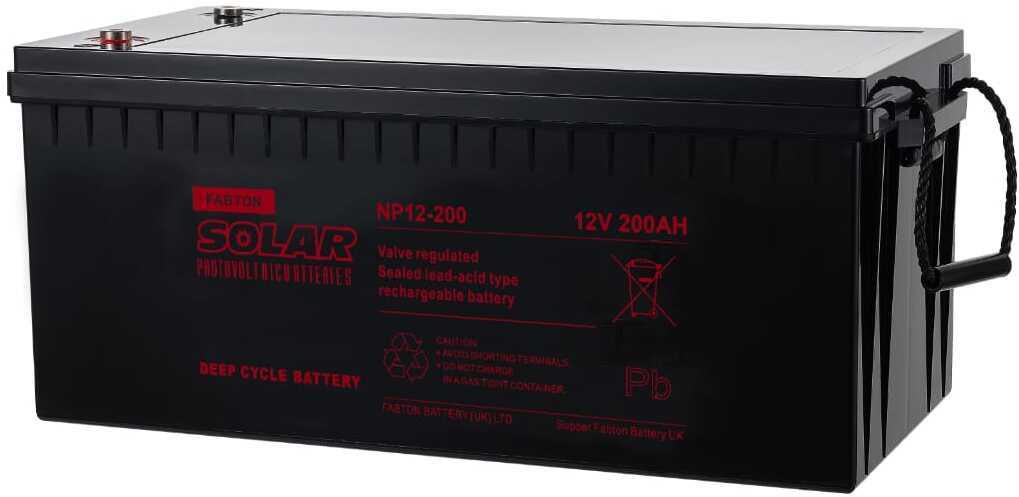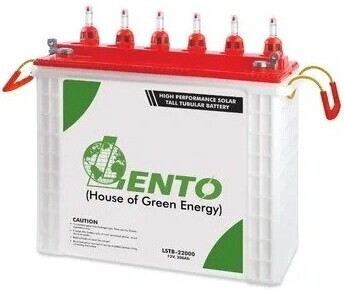The Future of Inverter Batteries in Industrial Power Solutions
Introduction
In today’s fast-evolving industrial landscape, energy demands are at an all-time high. Manufacturing plants, data centers, and heavy industries need consistent, reliable, and cost-efficient energy sources to maintain operations. This is where inverter batteries come into play as a vital component of industrial power solutions.
Inverter batteries are designed to store excess energy and convert it into usable electrical power when demand spikes or when there is a failure in the primary power supply. Their role in industrial power systems is becoming more critical as industries shift towards more sustainable, efficient energy solutions. With global pressures to reduce carbon footprints, these advanced storage technologies provide industries with the means to not only save energy but also cut costs and reduce reliance on traditional grid systems.
Read more...10 Innovative Uses of Inverter Batteries in Sustainable Energy Solutions
Key Takeaway
- Shift Towards Lithium-Ion Technology: Lithium-ion and LiFePO4 batteries are becoming the preferred choice over lead-acid due to their longer lifespan, faster charging, and higher efficiency.
- Increased Energy Storage Capacity: Advancements in battery technology are leading to higher-capacity inverter batteries, ensuring longer backup times for industrial operations.
- Smart Battery Management Systems (BMS): Future inverter batteries will feature AI-driven BMS to optimize performance, prevent overcharging, and extend battery life.
- Integration with Renewable Energy Sources: More businesses are adopting solar-compatible inverter batteries, reducing reliance on the national grid and cutting energy costs.
Kan 12v. 220AH Solar Tubular Battery
Current State of Inverter Batteries in Industrial Applications
Currently, inverter batteries are deployed in a variety of industrial settings, providing a bridge between energy production and consumption. The most common types of inverter batteries used in industries today are:
-
Lead-Acid Batteries: Although older, lead-acid batteries are still widely used due to their affordability and reliability. However, they have a shorter lifespan and are less energy-dense compared to newer technologies.
-
Lithium-Ion Batteries: Offering better energy efficiency, longer lifespan, and faster charging times, lithium-ion batteries are gaining popularity in industrial power systems. Their superior performance is making them an ideal choice for high-demand applications.
-
Nickel-Cadmium (NiCd) and Lithium Iron Phosphate (LiFePO4) Batteries: While less common, these batteries are also used in niche applications due to their resilience and longer life cycles.
Inverter batteries are mainly used to manage power in environments that require a constant energy supply. For example, industries that rely on 24/7 operations, such as data centers or food manufacturing, benefit from these systems as they mitigate the risk of downtime caused by power outages. Inverter systems are often paired with renewable energy sources like solar panels, where excess energy is stored in the batteries to be used when solar generation is low, offering a smart, efficient, and sustainable power solution.
Technological Advancements Driving the Future
The future of inverter batteries is being shaped by technological advancements that enhance their efficiency, lifespan, and performance. Some of the most important innovations include:
-
Battery Chemistry Advancements: The evolution of battery chemistries is a key driver for the future of inverter batteries. Solid-state batteries, for instance, promise higher energy densities and increased safety compared to traditional lithium-ion batteries. Lithium-sulfur batteries are also emerging, offering even greater energy storage capacities with less environmental impact.
-
Smart Inverters: Smart inverters play a crucial role in optimizing energy management systems. They allow for real-time monitoring and control of energy storage, ensuring that the right amount of power is used at the right time. These inverters enable industries to take advantage of dynamic pricing models by charging batteries during off-peak hours when electricity is cheaper and discharging them during peak hours to save on energy costs.
-
Microgrids and Decentralized Power Systems: As industries move toward energy independence, microgrids (localized energy systems) are gaining traction. Microgrids, powered by inverter batteries, allow industrial facilities to disconnect from the main power grid during disruptions or times of high demand. This decentralization not only improves energy security but also helps industries operate more efficiently.
-
AI and IoT Integration: Artificial intelligence (AI) and the Internet of Things (IoT) are transforming inverter battery technologies. AI-driven algorithms can predict energy consumption patterns, optimize charging and discharging cycles, and improve the overall lifespan of batteries. IoT sensors provide real-time data on battery health, enabling predictive maintenance and ensuring optimal performance.
The combination of these technological innovations will shape the next generation of industrial power solutions, making inverter batteries smarter, longer-lasting, and more efficient.
Read more...The Impact of Inverter Battery Technology on Renewable Energy Integration
Energos 12V-220AH Tubular Battery
The Role of Sustainability and Green Energy
One of the driving forces behind the growing adoption of inverter batteries in industrial applications is the increasing demand for greener, more sustainable energy solutions. With climate change concerns and stricter regulations on emissions, industries are under increasing pressure to adopt eco-friendly technologies.
Inverter batteries play a pivotal role in supporting renewable energy integration. They help industries store excess power generated by solar panels, wind turbines, or other renewable sources, making it available for use when demand is high or generation is low. This reduces the reliance on fossil-fuel-powered electricity and lowers overall carbon emissions.
The environmental benefits of inverter batteries are manifold:
-
Reduction in Greenhouse Gas Emissions: By supporting renewable energy, inverter batteries contribute to a reduction in carbon emissions from traditional power generation.
-
Energy Efficiency: These batteries allow for efficient energy use, reducing waste and the need for additional energy generation.
-
Supporting the Circular Economy: Many inverter batteries, especially lithium-ion and solid-state models, are designed to be recycled at the end of their life, ensuring minimal environmental impact.
Moreover, governments and regulatory bodies worldwide are offering financial incentives and policy support for industries that transition to renewable energy sources. As the green energy revolution accelerates, inverter batteries will continue to serve as key enablers of industrial sustainability.
Read more...Comparing the Best Inverter Battery Brands for Industrial Applications
Economic Impact and Cost Efficiency
Inverter batteries offer significant financial benefits to industries, making them a crucial investment for the future. While the initial cost of setting up an inverter battery system can be substantial, the long-term savings and potential returns on investment (ROI) make it an appealing option for businesses looking to optimize energy costs.
-
Reduced Energy Costs: One of the key advantages of using inverter batteries in industrial settings is the ability to store energy when it’s cheaper (e.g., during off-peak hours) and use it during periods of high demand. This helps industries avoid peak electricity charges, which are often significantly higher than during non-peak times.
-
Energy Independence: For industries that rely heavily on continuous power, inverter batteries can provide backup power during grid outages, preventing costly downtime. In areas where power interruptions are frequent or energy prices fluctuate unpredictably, having an independent power source becomes a significant advantage.
-
Extended Battery Lifespan and Durability: Modern inverter batteries are designed to last longer and offer more cycles than traditional alternatives, meaning companies will spend less on replacements and maintenance. Lithium-ion batteries, for example, have a much longer lifespan compared to lead-acid batteries, reducing overall operating costs in the long run.
-
Government Subsidies and Tax Benefits: Many governments offer financial incentives to businesses that invest in energy storage solutions and renewable energy systems. These incentives may include tax credits, grants, or rebates that can offset the initial setup costs. Furthermore, industries investing in cleaner energy solutions may benefit from positive public perception and align with global sustainability goals.
In summary, while the upfront investment may seem high, inverter batteries can ultimately provide significant savings through improved energy efficiency, reduced reliance on grid power, and long-term durability. Industries that make the transition to smarter energy solutions are positioning themselves for lower operational costs and a more sustainable future.
Fabton 12V-220AH Deep Cycle Solar Battery
Challenges in Implementing Inverter Batteries for Industrial Power
Despite the clear advantages of inverter batteries, there are several challenges that industries must consider when implementing these systems:
-
Initial Investment and Cost Considerations: The upfront capital required for setting up an advanced inverter battery system can be significant, especially for large-scale industrial operations. While the ROI is promising over time, some smaller businesses or industries with limited budgets may find the investment prohibitive.
-
Scalability Issues: While inverter batteries work well for small to medium-sized businesses, scaling these systems to meet the needs of large industrial operations can be complex. Industries with high energy demands may require a much larger and more sophisticated system, which can add complexity to the implementation.
-
Maintenance and Lifecycle Management: While inverter batteries generally have long lifespans, they still require regular monitoring and maintenance to ensure optimal performance. This includes checking battery health, managing charging cycles, and handling temperature regulation. Improper maintenance can lead to early degradation of battery life and affect the overall efficiency of the system.
-
Battery Disposal and Recycling: As with any energy storage system, the disposal of inverter batteries at the end of their lifecycle poses environmental challenges. While modern inverter batteries, particularly lithium-ion models, are designed to be recycled, the process can be complex and costly. Effective recycling infrastructure and processes are crucial for minimizing the environmental impact of battery waste.
While these challenges are significant, they can be mitigated with proper planning, a clear understanding of system requirements, and investing in high-quality technology.
Case Studies and Real-World Applications
Several industries have already begun to reap the benefits of inverter batteries in their power systems, demonstrating the potential of this technology.
-
Data Centers: Data centers require uninterrupted power to ensure continuous service. Many data centers have implemented inverter batteries to create reliable backup power systems that can seamlessly supply energy during grid failures. For example, large tech companies have adopted large-scale lithium-ion batteries to manage energy usage and improve efficiency while reducing operational costs.
-
Manufacturing Plants: Manufacturing industries with high energy consumption have successfully integrated inverter batteries with renewable energy sources, like solar power, to reduce reliance on grid electricity. One example is a manufacturing plant that installed a solar array with inverter batteries, allowing it to store energy during the day for use at night, resulting in significant savings on energy bills.
-
Warehouses and Distribution Centers: Inverter batteries are used in warehouses and distribution centers to provide energy during power outages, ensuring that critical systems like refrigeration or automated machinery stay operational. By coupling inverter batteries with renewable energy sources, these businesses are making strides toward sustainability while reducing their carbon footprint.
These real-world applications highlight the versatility and effectiveness of inverter battery technology across different industries, offering a glimpse into the future of energy storage in the industrial sector.
Lento Tubular Battery 220ah 12v
The Future Outlook for Inverter Batteries in Industrial Power
The outlook for inverter batteries in industrial applications is incredibly promising. As the global shift toward renewable energy accelerates, inverter batteries will play a pivotal role in shaping how industries manage their energy consumption and storage.
-
Predictions for the Next 5 to 10 Years: Over the next decade, we can expect to see a significant reduction in the cost of inverter battery systems. As battery technology improves and economies of scale kick in, the price of advanced inverter batteries will become more affordable for a wider range of industries. This will make energy storage solutions more accessible and attractive to smaller businesses, further driving adoption.
-
Smart Grids and Automation: The integration of inverter batteries with smart grid technology will make industrial energy systems even more efficient. These systems, powered by AI, will enable dynamic energy management, allowing industries to automatically adjust energy usage based on real-time data. Inverter batteries will act as a crucial part of these systems, storing excess energy during low-demand periods and releasing it during high-demand periods.
-
Energy Storage as a Service (ESaaS): The concept of Energy Storage as a Service is gaining traction, where companies can lease energy storage capacity rather than invest in expensive infrastructure. This approach will make energy storage solutions more flexible and cost-effective for industries that want to scale their energy storage capacity without significant upfront costs.
-
Market Growth and Adoption Trends: The industrial energy storage market is expected to grow rapidly in the coming years, with more industries recognizing the financial and environmental benefits of inverter battery solutions. As industries continue to adopt renewable energy, inverter batteries will become a core component of the energy infrastructure in sectors like manufacturing,
Frequently Asked Questions
1. What is an inverter battery and how does it work in industrial applications?
An inverter battery stores excess energy and converts it to electrical power when needed. In industrial applications, they help balance energy supply and demand by storing energy for later use, preventing downtime, and optimizing energy costs.
2. What are the key benefits of using inverter batteries in industrial settings?
Key benefits include reduced energy costs, energy independence, improved operational efficiency, support for renewable energy integration, and long-term sustainability.
3. How do inverter batteries help with energy storage for renewable energy sources?
Inverter batteries store excess energy generated by renewable sources, like solar or wind, ensuring that power can be used even when production is low (e.g., at night or during periods of low wind).
4. What challenges do industries face when implementing inverter batteries?
Challenges include high initial investment costs, scalability issues for large industrial setups, maintenance requirements, and proper disposal/recycling of old batteries.
5. What is the future outlook for inverter batteries in industrial applications?
The future of inverter batteries is promising, with technological advancements, cost reductions, and the growing adoption of renewable energy. Smart grids and AI integration will further enhance their capabilities in industrial power systems.
Related Articles
Commercial Inverter Systems: Power Solutions for Businesses in Nigeria
Cost Benefits of Using Distilled Water in Inverter Batteries
The Ultimate Guide to Choosing the Best Inverter Batteries in Nigeria
Conclusion
Inverter batteries are undoubtedly a critical component of the future of industrial power solutions. Their ability to store energy efficiently, support renewable energy sources, and reduce costs makes them indispensable for industries seeking sustainability and energy independence. While challenges such as initial investment, scalability, and maintenance exist, the technological advancements and financial incentives available today make this an ideal time for industries to transition to smarter, more sustainable power systems.
By investing in inverter battery systems, industries can significantly enhance their operational efficiency, reduce their environmental impact, and future-proof their energy strategies.
As industries move towards more sustainable and efficient energy solutions, now is the time to consider the transformative potential of inverter batteries for your business. If you're ready to integrate cutting-edge energy storage solutions, GZ Industrial Supplies offers a wide range of inverter batteries and energy management solutions to meet your industrial needs. Visit GZ Industrial Supplies to learn more about our products and how we can help you achieve energy independence and cost efficiency.
Recent Posts
-
Why Serious Mechanics Are Switching to Japanese-Made Shinano Air Tools
Japanese-Made Shinano Air Tools Key takeaway: Shinano’s tight-tolerance, twin-hammer designs d …Apr 24, 2025 -
Top 10 Hand Tool Brands for Professionals
Introduction When it comes to professional hand tools, quality, durability, and reliability are para …Apr 23, 2025 -
HOW DOES CORROSION INHIBITOR WORK
Introduction Corrosion has posed a lot of problems to various companies and industries; by interfer …Apr 22, 2025







